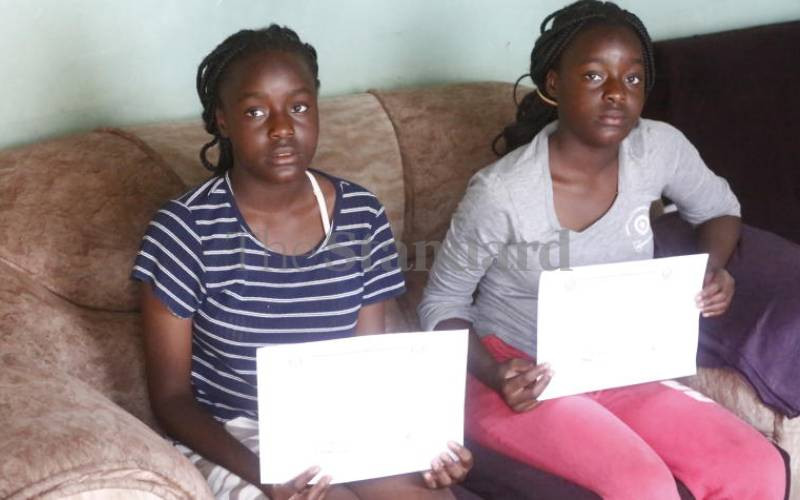“He was a promising young man who has left us all with a wound that will take a very long time to heal.”
The pastor had chosen his words well and the attendants seemed to identify with them. Everybody struggled to hold back their tears; everybody, except the dead man’s auntie.
When I asked her why she appeared unperturbed, she growled: “His father is as culpable as his killers. He spared no time for his son while the police spared no bullet on his growing body!”
Bosko’s family was known to me. I knew him as the brilliant youngster who once told me that he would be the first person to find a cure for cancer. He did well in his KCPE and earned a spot at a top national school.
But somewhere along the way, he lost it. He quit school and became a hardcore robber. Shortly before his death, I happened to bump into him. On asking why he quit school, he gave me a terse reply in sheng: “Nyinyi mabuda mumelenga mavijanaa viovyo (You older men have ignored the youth completely).”
CRIMINAL ELEMENTS
This country is losing many young people to criminality and who are then felled by police bullets. These are lives we should be nurturing, not burying. We are losing important human resources.
There are varied opinions on how the police ought to deal with the criminal elements in society. But important as they are, we must also realise that the family environment is the first place we ought to go to understand a criminal’s thoughts, desires, loves, values and goals.
That way, we would know, for instance, what collective efforts and approaches can be used to create a value-based environment for nurturing children who can compete on an equal footing with the rest of the world.
We can set up a programme that sees the Government, church and social agencies empower family-based programmes, especially those focused on value creation.
Are the criminal elements among us immune to rehabilitation? Has the prison system been subjected to an audit in terms of its rehabilitative potential? Can’t we develop a public amnesty programme that rehabilitates criminals to reintegrate them into society?
Such programmes can be devolved to estates and villages and target parents, especially those of criminals. The role of fatherhood in crime deterrence can be explored in such trainings.
David Popenoe, a noted sociologist and one of the pioneers of the relatively young field of research into fathers and fatherhood, has noted that “fathers are far more than just ‘second adults’ in the home .... Involved fathers bring positive benefits to their children that no other person is as likely to bring.”
This important knowledge that fathers have a direct impact on the well-being of their children is handy for professionals working with fathers — especially in the difficult, emotionally charged arena of child protective services (CPS).
IMPORTANT INFLUENCES
Stay informed. Subscribe to our newsletter
One of the most important influences a father can have on his child is indirect. A father who has a good relationship with the mother of his children is more likely to be involved and to spend time with his children, raising young people who are psychologically and emotionally healthy.
The quality of both parents’ relationship affects their behaviour. When it is healthy, they are more responsive, affectionate, and confident with their infants; more self-controlled in dealing with defiant toddlers; and better confidants for teenagers seeking advice and emotional support.
From interactions with their fathers, children learn how to regulate their feelings and behaviour. Rough-housing, for example, can teach children how to deal with aggressive impulses and physical contact without losing control of their emotions. Generally speaking, fathers also tend to promote independence.
A recent study done in Eastlands, Nairobi, found that children who had a good relationship with their fathers were less likely to experience depression, exhibit disruptive behaviour or lie. It also found that boys with involved fathers had fewer behaviour problems and girls had stronger self-esteem.
The writer is a researcher in mental health.
[email protected]
 The Standard Group Plc is a
multi-media organization with investments in media platforms spanning newspaper
print operations, television, radio broadcasting, digital and online services. The
Standard Group is recognized as a leading multi-media house in Kenya with a key
influence in matters of national and international interest.
The Standard Group Plc is a
multi-media organization with investments in media platforms spanning newspaper
print operations, television, radio broadcasting, digital and online services. The
Standard Group is recognized as a leading multi-media house in Kenya with a key
influence in matters of national and international interest.
 The Standard Group Plc is a
multi-media organization with investments in media platforms spanning newspaper
print operations, television, radio broadcasting, digital and online services. The
Standard Group is recognized as a leading multi-media house in Kenya with a key
influence in matters of national and international interest.
The Standard Group Plc is a
multi-media organization with investments in media platforms spanning newspaper
print operations, television, radio broadcasting, digital and online services. The
Standard Group is recognized as a leading multi-media house in Kenya with a key
influence in matters of national and international interest.









